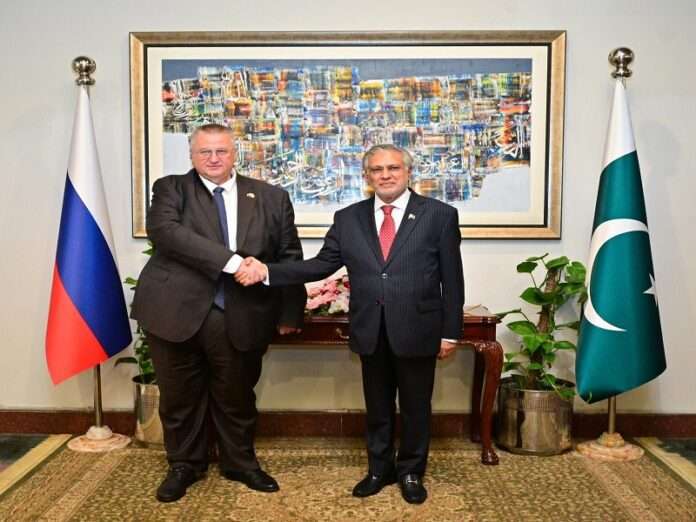Russian Deputy Prime Minister Alexei Overchuk’s trip to Pakistan has become a milestone in their relations after the wide range of issues that they agreed to more closely cooperate on. This broadly includes trade, industry, energy, connectivity, science, technology, and education. In particular, they also reached a deal for Russia to modernize Pakistani agriculture with machinery and fertilizer plant upgrades, while talks are underway over the possibility of building a new steel mill in Karachi.
Overchuk also met with Chief Of Army Staff Asim Munir to discuss defense and regional security issues, which follows reports of Russian drone sales to Pakistan amidst the upsurge of terrorism there. Another development of importance was Pakistan acceding to the existing MoU for creating a Central Eurasian Corridor between Belarus, Russia, Kazakhstan, Uzbekistan, Afghanistan, and Russia. Of relevance, Russia said that it would support Pakistan joining BRICS and that they’re discussing an FTA too.
These last three goals might not be achieved anytime soon though due to deteriorating Pakistani-Taliban relations impeding trans-Afghan trade, India’s right to veto Pakistan’s membership in BRICS per the group’s consensus principle, and Pakistan’s continued refusal to recognize Eurasian Union member Armenia. Nevertheless, the bigger picture is that Russian-Pakistani relations are surprisingly taking on strategic dimensions, which few could have foreseen for the reasons that’ll now be explained.
This analysis here from over the summer elaborated more on the prior doubts about this, but they can be summed up as “Pakistan’s failure to liberate itself from the yoke of American vassalage; the lack of funds for financing these projects; American and Chinese jealousy if Pakistan gives preferential investment terms to Russia (let alone agrees to grossly lopsided barter arrangements); and worsening Baloch-TTP terrorist threats.” They’ve also yet to clinch their long-negotiated strategic energy deal.
What appears to have happened is that both sides have found common ground between themselves and with regard to their respective partners. On the bilateral front, each is sincerely interested in apolitical economic cooperation, with the Pakistani economy urgently requiring more foreign investment while the Russian one urgently needs more export markets. This accounts for why Overchuk proposed that Pakistan rely more on the North-South Transport Corridor (NSTC) for facilitating their trade.
He also suggested that the NSTC and BRI could be paired together, which of course raised eyebrows among many in India, whose observers were already closely monitoring his visit. Some clarification is therefore in order. Candidly speaking, Russia has already invested so much time into negotiating what it truly believes to be a game-changing strategic energy deal with Pakistan that it’s reluctant to move on after they’ve thus far failed to make any progress on this, hence Overchuck’s sweettalking.
His rhetoric about BRI, BRICS, and an FTA is seemingly meant to move the aforesaid talks along seeing as how none of these three ambitious goals is solely within Russia’s ambit to agree to. The NSTC is just a multilateral transport corridor; BRICS is basically a talking club which requires consensus before anyone else can join or even sit in on their meetings; and the same goes for an FTA with the Eurasian Union. Both sides know this, but casual observers might not, which is why some could have been concerned.
From the perspective of an average Indian, it might therefore seem like Russia is pivoting towards Pakistan at their country’s expense, with the possibility emerging in their minds of political tensions developing between these decades-long strategic partners over Russia’s newfound support of Pakistan. The reality though is a lot more mundane as was explained since Overchuck is just trying to have Russia stay on Pakistan’s good side so that they can finally make progress on their strategic energy talks.
Apart from the unintended blowback that these optics might entail for popular Indian perceptions of Russia’s regional policy, Russia and Pakistan both benefit from the way that others view their ties. Russia wants the world to see that even the loyal decades-long American partners like Pakistan are cooperating with it nowadays, thus representing yet another failure of the West’s containment policy, while Pakistan wants to incentivize China and the US into offer it better deals by baiting them with Russia.
Russia and Pakistan haven’t yet reached any flagship agreements, with everything that’s been reached up until this point representing low-level cooperation that each already has with many other countries. While it’s indisputably an achievement for these former Old Cold War rivals to put their past behind them by comprehensively ramping up cooperation, ergo why Overchuck’s visit was described as a milestone in the introduction to this analysis, nothing major has yet to be agreed to.
Each is therefore using the optics of this trip to advance their respective interests vis-à-vis third parties while still expanding the scope of their relations to advance their national interests as well. It’s important for observers to understand that there’s a lot of hype but very little substance. Both are making a big deal about their ties, but they’re still unimpressive when compared to what they already have with others. Even so, if Pakistan musters the political will, then they might truly become strategic one day.







